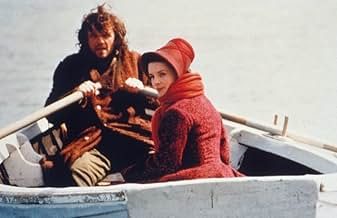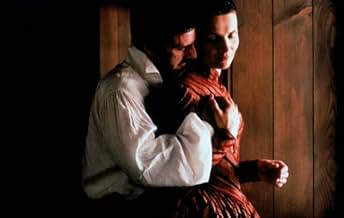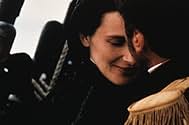IMDb RATING
7.1/10
5.8K
YOUR RATING
In a small French colony, a drunken man kills someone. While a guillotine is being shipped in, he changes, becoming a good and popular man.In a small French colony, a drunken man kills someone. While a guillotine is being shipped in, he changes, becoming a good and popular man.In a small French colony, a drunken man kills someone. While a guillotine is being shipped in, he changes, becoming a good and popular man.
- Director
- Writers
- Stars
- Awards
- 3 wins & 9 nominations total
- Director
- Writers
- All cast & crew
- Production, box office & more at IMDbPro
Featured reviews
The ancient Greeks, gifted with an abstract way of thinking that was always trying to come down to earth and clothe itself with the commonplace occurrences of everyday life, did not have one all-embracing term for love, a we do, but broke it down into four types: affection (storge), friendship (phileo), sex (eros) and charity (agapao). And probably not since the ancient Greeks has a love story come along which not only divides love into its four types, but also weaves them, with enormous skill, into a single story. The Widow of Saint-Pierre is a love story of the tragic Greek proportions. It's an enormously beautiful movie, a story that gains power with every viewing. And for that reason, it's one of the most remarkable videos I've seen in a very long time.
We've all seen a plethora of films from Hollywood, which basically confine love, and the act of love, to eros. We all know the well-worn script. But what would it look like to view a film in which a relationship expresses all four types of love, and throbbing full force? I would be giving too much away if I were to tell you how these four types of love are rolled up so tightly into a single relationship, but that's exactly what we seen in the liaison between Jean, the Captain (Auteuil) and his wife, Pauline (Binoche). It's intensely interesting, because the performances are pitch-perfect. Even the cowardly bureaucrats, who feel threatened by the captain and his wife, are a picture of cowardly perfection. Their motives are all too human, all too real. But so is the unfathomable love they don't understand, and fear.
One of the things I really appreciate about this film is the way it expresses all forms of love as having boundaries. Jean and Pauline are not clinging vines. What we see is a mature, healthy relationship, each partner respecting the unique characteristics of the other. What a contrast to the infantile clinging vine romances out of Hollywood!
We've all seen a plethora of films from Hollywood, which basically confine love, and the act of love, to eros. We all know the well-worn script. But what would it look like to view a film in which a relationship expresses all four types of love, and throbbing full force? I would be giving too much away if I were to tell you how these four types of love are rolled up so tightly into a single relationship, but that's exactly what we seen in the liaison between Jean, the Captain (Auteuil) and his wife, Pauline (Binoche). It's intensely interesting, because the performances are pitch-perfect. Even the cowardly bureaucrats, who feel threatened by the captain and his wife, are a picture of cowardly perfection. Their motives are all too human, all too real. But so is the unfathomable love they don't understand, and fear.
One of the things I really appreciate about this film is the way it expresses all forms of love as having boundaries. Jean and Pauline are not clinging vines. What we see is a mature, healthy relationship, each partner respecting the unique characteristics of the other. What a contrast to the infantile clinging vine romances out of Hollywood!
Juliette Binoche plays the wife of a military officer in a remote island town in 1849 Newfoundland who becomes devoted to the cause of saving the life of a condemned murderer. I was torn between admiring `The Widow of Saint-Pierre' for not taking the obvious route of having the captain's wife fall in love with her protege and run off with him (e.g., `Mrs. Soffel"), and a feeling of letdown that it was avoiding opportunities for more vivid and realistic drama. That there is an attraction between the two is made clear, especially in the highly charged, yet muted eroticism of the reading lesson scene. This film was based on a true story, but I couldn't help wondering if the actual killer was as saintly and devoid of guile as he seems in this movie. Among other things, he resists his attraction to his benefactress, although she would probably be more than willing to sleep with him, saves the life of a village woman whose house has slipped its moorings, and passes up an excellent chance to escape because he doesn't want to get anybody in trouble. He impregnates another woman, although it appears to be true love, and he then does the decent thing and marries her. One could accept that a criminal could be redeemed, but here he's a little too good to be true, reinforcing my suspicion that the characterization was meant more to reinforce the filmakers' anti-capital punishment stance than as a reflection of his actual personality. Daniel Auteil as her husband is stuck playing a character whose emotions remain largely inscrutable. The film would have us believe that there is no jealousy or resentment in the husband as his wife dedicates her life to rehabilitating and saving the condemned man under his charge. Ultimately, the captain gives up his own life for both of them, but I kept waiting for a significant sign that he had some inner conflict about doing so. After all, he is a career military officer sworn to uphold the law as it is. Who knew that underneath he was a bleeding heart liberal! This film is interesting and absorbing up to a point, but ultimately, it's also bland and overly complacent dramatically.
I was most impressed with the visual language of this movie that does not waste words to show emotions. The tensions are well reflected in the play of the actors, whose gestures, shrugs and smiles say more than a thousand lines.
Another interesting feature of the movie is that it does not follow the easy path of romance that is "expected" by the public. In turn, it exposes a world which is cruel, unfair, where justice is determined by personal interests and where those who fight the system are seen as mad and excluded from the "high society".
It is a movie about the determination to fight for something one believes in!
Another interesting feature of the movie is that it does not follow the easy path of romance that is "expected" by the public. In turn, it exposes a world which is cruel, unfair, where justice is determined by personal interests and where those who fight the system are seen as mad and excluded from the "high society".
It is a movie about the determination to fight for something one believes in!
THE WIDOW OF ST.-PIERRE may not be a great film, but amidst a crop of mediocre current releases, it's a fine effort that boasts a hardworking cast, awesome costumes and sets, terrific cinematography and excellent direction. For those unlikely to stay in and read MOBY DICK, the combination of austere location, mid-19th-century maritime theme, and the Reaper looming o'er the ocean tides offers a satisfying divertissement on a cloudy Sunday afternoon.
Based on actual court records, the plot begins after a Parisian military captain, Jean (Daniel Auteuil), and his new wife, Madame La (Juliette Binoche), arrive on an isolated French isle off the coast of Newfoundland, where widows outnumber balmy days 50 to 1. One night, two blind-drunk men brutally knife a man to find out if he's `fat or just big.' The court sentences instigator Neel Auguste (Yugoslav director Emir Kusturica) to death by guillotine, `the widow,' in French parlance. But the remote fishing island does not possess the instrument of destruction that its French rulers dictate and must obtain a loaner from Martinique. While awaiting its arrival, the government locks Neel in a dark cell and entrusts him to the care of the Captain and Madame La.
An MSW waiting to happen, Madame has a weakness for `desperate cases.' She asks Neel to build her a greenhouse and tend her plants, a challenging request in this hardscrabble environment. As the Parisian belle negotiates her homesickness and the austerity of her surroundings by cultivating her garden, Neel confronts his own banishment from society and cultivates his compassion. This is one of several lovely parallelisms director Patrice Leconte teases out.
The sexual tension between Madame and Neel, though enacted subtly, is nevertheless palpable. During a reading lesson, their fingers brush while scanning a page. As Neel scarfs down her soup in a mildly bestial manner, she looks on lovingly. And when he asks her why she so nurtures him, she replies, `We change, whatever we do. I am sure of that.'
Meanwhile, the fisherfolks' tongues are wagging-ever cautioning Madame's loving husband about the duo's blossoming relationship. The Captain, however, venerates his wife's `humanism' and trusts her enough not to interfere. He is another wonderful character, both strong and sensitive, passionate in his love of his wife, unwilling to back down in his defense of their collective ideals.
Both Binoche and Kusturica prove more than equal to their roles. Binoche imbues her character with much more depth than that of Vianne in CHOCOLAT. With her limpid brown eyes and achingly empathic face, she elevates this personage to the level of classic tragic heroine. Kusturica, given a part that begs overacting, never wrings out our emotions, yet shows he possesses true remorse for his actions and a heart kinder still than that of his benefactors.
Most memorable is the set. Shot in Nova Scotia and Quebec, the film uses clapboard and stone buildings, often snow-salted, as an apt metaphor for the government's rigidity in refusing to commute Neel's sentence, despite his overwhelming popularity in the village as a doer of good deeds. Clearly the film excoriates capital punishment, with such dialogue as Madame's fervent cry, `They aren't punishing the same man they sentenced!'
This widow's walk proceeds at a leisurely pace, perhaps a mite too slowly for 21st-century attention spans. But overall, if you like a good, dark tragedy, pick a dreary night and go.
Based on actual court records, the plot begins after a Parisian military captain, Jean (Daniel Auteuil), and his new wife, Madame La (Juliette Binoche), arrive on an isolated French isle off the coast of Newfoundland, where widows outnumber balmy days 50 to 1. One night, two blind-drunk men brutally knife a man to find out if he's `fat or just big.' The court sentences instigator Neel Auguste (Yugoslav director Emir Kusturica) to death by guillotine, `the widow,' in French parlance. But the remote fishing island does not possess the instrument of destruction that its French rulers dictate and must obtain a loaner from Martinique. While awaiting its arrival, the government locks Neel in a dark cell and entrusts him to the care of the Captain and Madame La.
An MSW waiting to happen, Madame has a weakness for `desperate cases.' She asks Neel to build her a greenhouse and tend her plants, a challenging request in this hardscrabble environment. As the Parisian belle negotiates her homesickness and the austerity of her surroundings by cultivating her garden, Neel confronts his own banishment from society and cultivates his compassion. This is one of several lovely parallelisms director Patrice Leconte teases out.
The sexual tension between Madame and Neel, though enacted subtly, is nevertheless palpable. During a reading lesson, their fingers brush while scanning a page. As Neel scarfs down her soup in a mildly bestial manner, she looks on lovingly. And when he asks her why she so nurtures him, she replies, `We change, whatever we do. I am sure of that.'
Meanwhile, the fisherfolks' tongues are wagging-ever cautioning Madame's loving husband about the duo's blossoming relationship. The Captain, however, venerates his wife's `humanism' and trusts her enough not to interfere. He is another wonderful character, both strong and sensitive, passionate in his love of his wife, unwilling to back down in his defense of their collective ideals.
Both Binoche and Kusturica prove more than equal to their roles. Binoche imbues her character with much more depth than that of Vianne in CHOCOLAT. With her limpid brown eyes and achingly empathic face, she elevates this personage to the level of classic tragic heroine. Kusturica, given a part that begs overacting, never wrings out our emotions, yet shows he possesses true remorse for his actions and a heart kinder still than that of his benefactors.
Most memorable is the set. Shot in Nova Scotia and Quebec, the film uses clapboard and stone buildings, often snow-salted, as an apt metaphor for the government's rigidity in refusing to commute Neel's sentence, despite his overwhelming popularity in the village as a doer of good deeds. Clearly the film excoriates capital punishment, with such dialogue as Madame's fervent cry, `They aren't punishing the same man they sentenced!'
This widow's walk proceeds at a leisurely pace, perhaps a mite too slowly for 21st-century attention spans. But overall, if you like a good, dark tragedy, pick a dreary night and go.
In 1849, in the Archipelago of Saint-Pierre et Miquelon, the drunken Ariel Neel Auguste (Emir Kusturica) and his partner Louis Ollivier (Reynald Bouchard) kill for a futile motive (to see if he is fat or just big) the fishing boat captain Coupard (Michel Daigle). Nell, who stabbed the victim, is sentenced to die with his head severed in the guillotine while Louis is sentenced to hard labor. During the transportation to the prison under the custody of Captain Jean (Daniel Auteuil), there is an accident and Louis dies. While spending his days in the cell waiting for the guillotine and the executioner, Neel is invited by the captain's wife Mrs. Pauline (Juliette Binoche) to help her in her garden and becomes her protégé. Later he has a process of rehabilitation helping the locals in minor works and becomes very popular in the island. When he saves the building Café du Nord and her owner from sinking in the sea, his popularity increases and nobody but the governor and politicians of the council wants his death. Neel marries Eleontine Jeanne-Marie, but sooner he is informed that the ship Marie Galante has just left Martinique bringing a guillotine. Now the Governor and politicians need to find an executioner in the population to execute the sentence.
"La Veuve de Saint-Pierre" is a beautiful dramatization of a story of rehabilitation and intolerance. I do not know whether this event is partially true or not – there are references in Internet to this story but in sites that I can not trust – but this movie is wonderful. The story and screenplay are engaging and very well written with powerful lines; the direction of Patrice Leconte and the performances are top- notch, with Juliette Binoche extremely beautiful and elegant as usual and showing a magnificent chemistry with Daniel Auteuil; the cinematography and costumes are wonderful. Based on my adjectives, it is unnecessary to say that I loved this movie. My vote is eight.
Title (Brazil): "A Viúva de Saint-Pierre" ("The Widow of Saint-Pierre")
"La Veuve de Saint-Pierre" is a beautiful dramatization of a story of rehabilitation and intolerance. I do not know whether this event is partially true or not – there are references in Internet to this story but in sites that I can not trust – but this movie is wonderful. The story and screenplay are engaging and very well written with powerful lines; the direction of Patrice Leconte and the performances are top- notch, with Juliette Binoche extremely beautiful and elegant as usual and showing a magnificent chemistry with Daniel Auteuil; the cinematography and costumes are wonderful. Based on my adjectives, it is unnecessary to say that I loved this movie. My vote is eight.
Title (Brazil): "A Viúva de Saint-Pierre" ("The Widow of Saint-Pierre")
Did you know
- TriviaThe film was to be completely filmed on the island of Saint-Pierre, but when the snow failed to arrive, the production had to move further north to Newfoundland for certain sequences.
- GoofsWhen Neel is told he's strong enough to "ramer jusqu'au chez les Anglais", the English subtitles say "row over to Canada" rather than "row over to the English". This introduces an error: both the geography and the dialogue in other scenes make it clear that Newfoundland is meant, but Newfoundland wasn't part of Canada until 1949.
- ConnectionsFeatured in The 58th Annual Golden Globe Awards 2001 (2001)
- How long is Widow of St. Pierre?Powered by Alexa
Details
- Release date
- Countries of origin
- Official site
- Language
- Also known as
- Widow of St. Pierre
- Filming locations
- Fortress of Louisbourg, Louisbourg, Nova Scotia, Canada(as Saint-Pierre)
- Production companies
- See more company credits at IMDbPro
Box office
- Budget
- FRF 100,000,000 (estimated)
- Gross US & Canada
- $3,193,889
- Opening weekend US & Canada
- $31,702
- Mar 4, 2001
- Gross worldwide
- $7,193,889
- Runtime1 hour 52 minutes
- Color
- Sound mix
- Aspect ratio
- 2.35 : 1
Contribute to this page
Suggest an edit or add missing content

Top Gap
By what name was La veuve de Saint-Pierre (2000) officially released in India in English?
Answer































